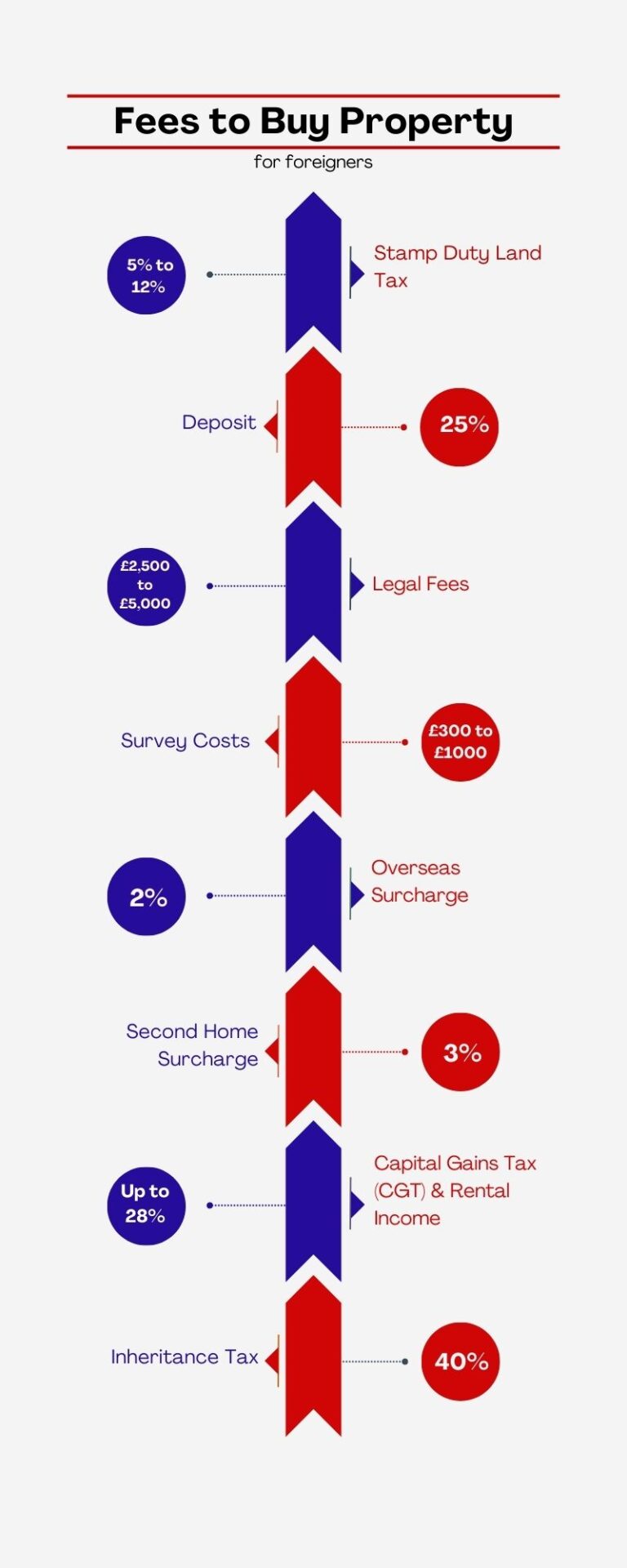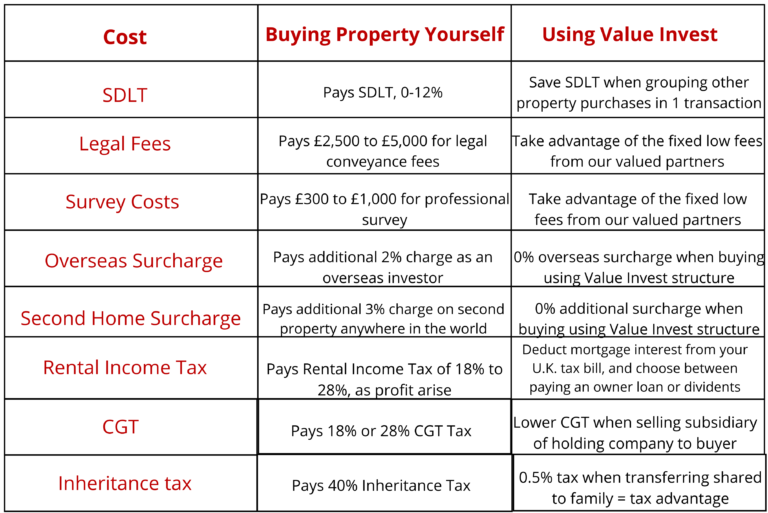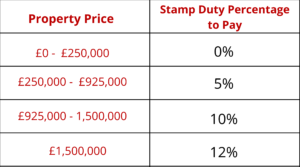Beyond the purchase price of a new home, there are a number of fees when buying a house which can add more than 10% to the total bill, especially for foreigners. Buying a property can be a complex process that might take up to 12 weeks, and there are a number of costs, such as taxes, legal fees, or survey costs, that need to be considered in addition to the purchase of the property itself.

The cost of the property is by far the largest expense, since Real Estate has now a total value of £8.678 trillion of the country’s economy, and unless you are buying the property outright, it will be covered by the sum of your deposit and the amount you borrow from the lender (your mortgage). Using Value Invest to support your purchase will significantly help you reduce these costs, between 50% to 75%, on average.

–
–
Stamp Duty Land Tax (SDLT) is a significant cost to consider when buying property in the U.K. and, often, the largest additional cost of buying a home. It’s a tax paid by the buyer of a UK residential property when the purchase price exceeds £250,000.
The stamp duty rate ranges from 5% to 12% of the purchase price, depending upon the value of the property bought, the purchase date and whether you are a multiple home owner. Calculating the stamp duty accurately and understanding possible applicable exemptions can help property owners and buy-to-let investors manage their finances more effectively during the acquisition process and calculate their potential afterwards winnings more accurately.

When purchasing property in the U.K., the deposit is a critical component and directly influences the house buying process and mortgage options. Typically, the buyer will need to put down at least 25% to 50% of the property’s value as deposit. So, if we are talking about a £250,000 home, this will mean a value between £62,500 and £125,000. As a rule of thumb, the more money you put down as a deposit, the better deal you can get on the interest rate on your mortgage, being that the current BOE rate is at 5,25%. Keep in mind, however, that putting all the money you can down as the deposit is not necessarily the most sensible thing to do, as there are other costs you will need to cover, and you may want to keep some aside in case of an emergency.
Legal fees, also known as conveyancing fees, are related mostly to the costs associated with the legal transfer of the house ownership from the seller to the buyer. Conveyancing involves two main components: the solicitor’s legal fees, which pays for the solicitor’s time and expertise on handling these transactions properly and the disbursements which can include bureaucracy costs such as, for example, Land Registry fees, local authority searches or other general necessary checks. How much conveyancing fees cost depends on the value of the home you are buying, whether it is freehold or leasehold and the local searches you have done, and an effective conveyancing will ensure a smooth transaction and safeguard you from any possible legal issues regarding your property.
Surveys can prove expensive, from £300 to well over £1000. Depending on the age and build of the property, it’s well worth getting a professional survey of the state of your building’s construction and condition before you buy it. The cost of the survey depends on what type of survey you choose. These surveys can assess the property’s condition, identifying any potential issues that could either affect its value or require repairs in the future. The more detailed your survey is, the better results you get. A survey will either provide you peace of mind regarding the status of your property, or, in a worst case scenario of some issues being found, help you renegotiate the price.
For international buyers looking to invest in the U.K. property market, this charge is one to be aware of, since it adds an additional 2% on top of the standard SDLT rates for non-resident buyers. For instance: a non-resident purchasing a property for £500,000, will typically pay the surcharge of £10,000. It’s crucial for an international investor to be correctly informed regarding this charge to plan their property acquisitions.
When buying an additional property in the U.K, investors are subject to a second SDLT surcharge, that adds an extra 3% on top of the standard rates. This tax applies to properties valued above £40,000.
CGT is a crucial consideration for buy-to-let investors. This tax is measured by the profit made from your assets, including properties that are not your primary residence. It’s important to mention that there are annual tax-free allowances for capital gains, and these will help you reduce the taxable amount. For buy-to-let investors it is very important to carefully plan these costs in order to maximize their returns and minimize tax liabilities. Having professional help will provide valuable information.
Income tax is a very significant consideration when purchasing property to let. Those receiving rental income from their U.K. properties are considered to have a regular income, therefore, being subject to a tax based on your overall income. It’s mandatory to keep track of allowable expenses such as property maintenance, agent fees or interest, as these can actually be deducted and reduce your taxable amount. Good understanding of the Income Tax regulations will provide efficient financial planning and help you optimize your rental income, and for this, consulting with a professional will assure you maximize your tax efficiency.
Inheritance Tax is the tax on the assets of someone who has passed away, that may include their property, money, or general possessions. Currently, the standard rate is 40% and it is charged on the portion of the assets that exceeds the tax-free threshold of £325,000. This value may change depending on who inherits the goods. Efficient planning and advice is essential to reduce the impact of IHT.
The potential for high returns and a historically stable market make the UK an attractive option for foreign investors. Finding the help of expert professionals who can help you maximize your returns and tax efficiency by planning the right investment strategy for you can give you the orientation of how to take advantage of this dynamic market.
Contact Value Invest today to learn how to save on fees when purchasing a property in the UK, and make a lucrative property investment in the UK.
Continue reading interesting articles:
Why You Should Invest in the Fast Growing London Commuter Belt of England